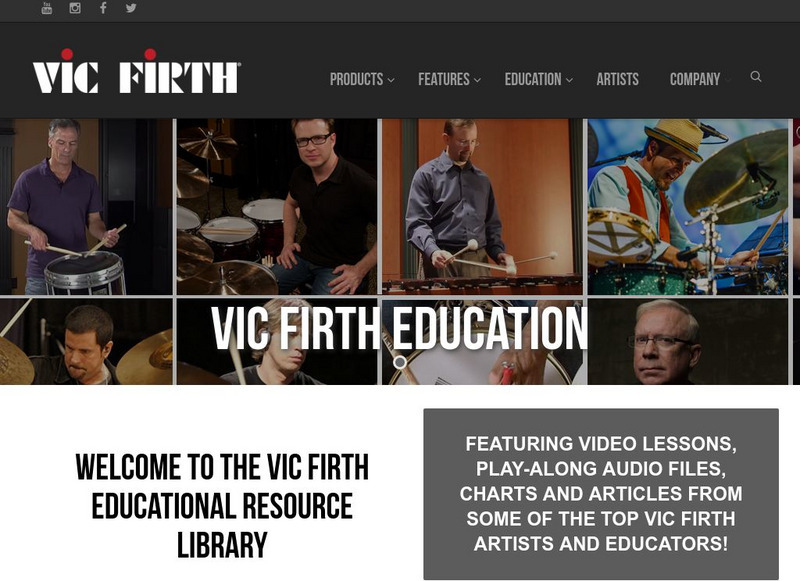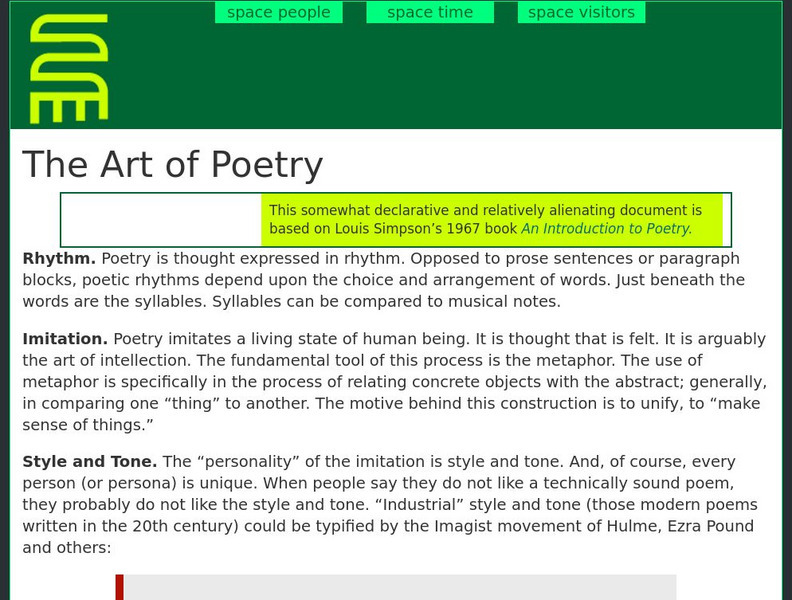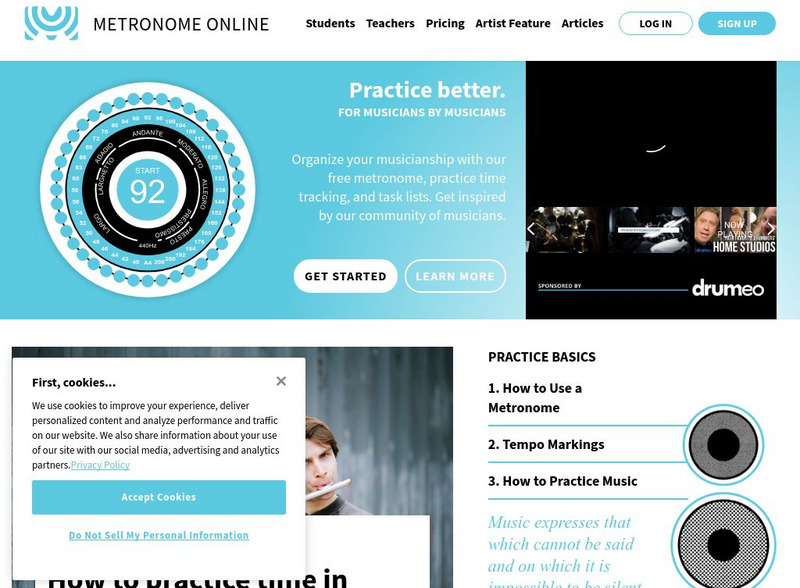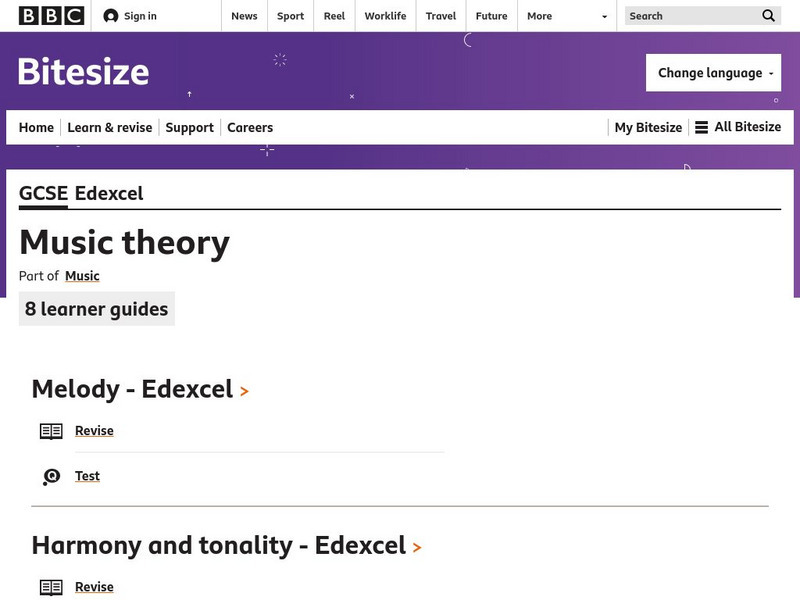Quia
Quia: Rhythm
Try these review activities in your music class! Chose from four games: matching, concentration, flashcards, or a word search. Vocabulary words on the topic of musical rhythm are used in these exercises.
Quia
Quia: Musical Elements
A great matching game to reinforce music vocabulary and an understanding of the elements of music.
Frontiers Media
Frontier: So You Think You Can't Dance?
Believe it or not, even babies can feel the beat of a rhythm. However, science has documented the first case of a person who could not dance to the beat. His name is Mathieu, and he is an intelligent, talented - even musical - guy with...
National Endowment for the Humanities
Neh: Edsit Ement: Preparing for Poetry: A Reader's First Steps
In this lesson plan, learners will consider Preparing for Poetry: A Reader's First Steps. Worksheets and other supporting materials can be found under the Resources tab.
Austin Independent School District
Austin Independent School District: Phonological Awareness Activities [Pdf]
A series of ready-to-print cards filled with ideas and activities to increase students' recognition and understanding of rhyme and rhythm.
Austin Independent School District
Austin Independent School District: Phonological Awareness Activities [Pdf]
A series of ready-to-print cards filled with ideas and activities to increase students' recognition and understanding of rhyme and rhythm. In Spanish.
Houghton Mifflin Harcourt
Holt, Rinehart and Winston: Elements of Literature: Poetry You've Got Rhythm [Pdf]
A short but informational worksheet for students on the rhythmical sounds of poetry. Includes information about the different types of meter and feet, and allows students to make connections and analysis.
PBS
Wgbh: Peep and the Big Wide World: Games: Sounds Like Fun!
Cleverly animated game that alerts young learners to the musical sounds all around them in their everyday environments. A useful exercise in helping children understand sound patterns and repetitive beats and the meaning of start and...
Other
Vic Firth: Educator's Resource Library
This website is a cornucopia of resources for percussion instruction. There are videos, audiocasts, podcasts, interviews with talented percussionists. Please check out this website is you are interested in any aspect of percussion.
TeachEngineering
Teach Engineering: Swinging on a String
Students explore how pendulums work and why they are useful in everyday applications. In a hands-on activity, they experiment with string length, pendulum weight and angle of release. In an associated literacy activity, students explore...
Indiana University
Archives of African American Music and Culture
Contains resources on black culture and music from the early 1900s to the present.
Other
Kintespace: The Art of Poetry
This site is an analysis of rhythm, imitation, style, tone, and technique of poetry. References to imagists and their works are also included
Other
Metronome Online
This free online metronome is ideal for anyone who does not have a metronome. It allows you to choose any tempo so you can practice at a steady pace.
BBC
Bbc: Music Theory
This resource presents a fun and interactive way to learn all about the elements of music. It offers links to information, definitions, assessments, and examples of melody, harmony and tonality, structure, tempo, metre and rhythm,...
Other
The Basics of Reading Music
This site is an overview of how to read music. The basics of notation such as note and rest values, the names of lines and spaces of both treble and bass clefs, etc. are covered. Includes downloadable audio files.
Other
Millcrest Academy: Rhyme Scheme
This page lists and defines many poetic terms commonly associated with rhyme and rhyme scheme. Unfortunately, there are no examples given. The list includes the following: anapestic meter, blank verse, couplet, dactylic meter, end rhyme,...
ArtsNow
Arts Now Learning: Rhythmic Experiences [Pdf]
In this lesson. students will learn that musical symbols have numerical values as they divide beats and meters, perform and create rhythm patterns, and practice operations with fractions.
ArtsNow
Arts Now Learning: The Sound of Numbers [Pdf]
In this lesson, learners will explore numbers and their relationships through rhythm and learn how every aspect of music can be described mathematically.
TED Talks
Ted: Ted Ed: Why Shakespeare Loved Iambic Pentameter
Shakespeare sometimes gets a bad rap in high schools for his complex plots and antiquated language. But a quick peek into the rhythm of his words reveals a poet deeply rooted in the way people spoke in his time- and still speak today....
Other
Learning4 Kids: We're Going on a "Teddy" Bear Hunt
Playing with songs and books helps prepare children for future learning and teach them beginning pre-reading skills. Re-enacting we're going on a bear hunt is a fun activity we can do with our kids to help promote this learning through...
Alabama Learning Exchange
Alex: I Know an Old Lady Who Swallowed a Fly
This instructional activity teaches students to sing along to a cumulative song, maintain a steady beat while singing, and create movements that go with the song's rhythm.
Alabama Learning Exchange
Alex: Rhythm and Solfege Antics!
Lesson introducing the Kodaly method to teach the rhythm tree and solfege. Students combine rhythm and solfege patterns and use them with familiar songs such as "Mary Had a Little Lamb."
Alabama Learning Exchange
Alex: It's Your Birthday, Dr. Seuss!
This lesson plan is intended to be used during the month of March when the class is preparing to celebrate Dr. Seuss Day. After listening to and reading different stories by Dr. Seuss, the students have opportunities to compare and...
Alabama Learning Exchange
Alex: Rhythmic Discovery Read Simple Rhythmic Patterns
Lesson discussing quarter, eighth, and half notes and using them to create rhythms for students to clap. Includes instructions for 4 small group centers.


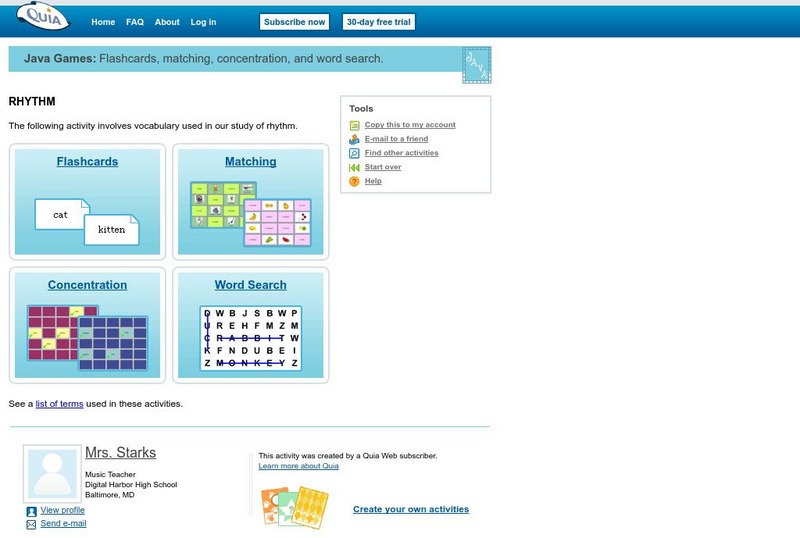

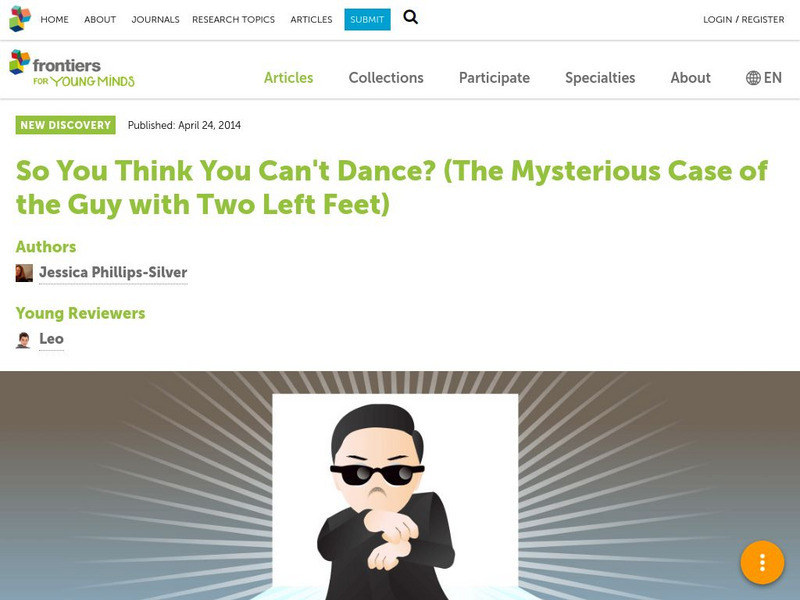

![Austin Independent School District: Phonological Awareness Activities [Pdf] Activity Austin Independent School District: Phonological Awareness Activities [Pdf] Activity](https://d15y2dacu3jp90.cloudfront.net/images/attachment_defaults/resource/large/FPO-knovation.png)
![Holt, Rinehart and Winston: Elements of Literature: Poetry You've Got Rhythm [Pdf] Unit Plan Holt, Rinehart and Winston: Elements of Literature: Poetry You've Got Rhythm [Pdf] Unit Plan](http://content.lessonplanet.com/resources/thumbnails/410060/large/bwluav9tywdpy2symdiwmduymc03otczlw41bjdpdy5qcgc.jpg?1589985147)

